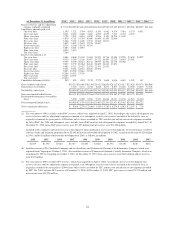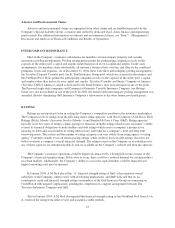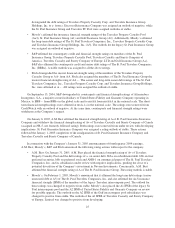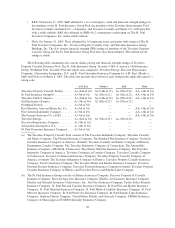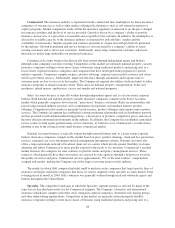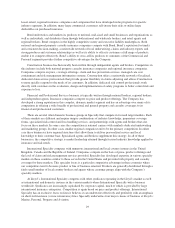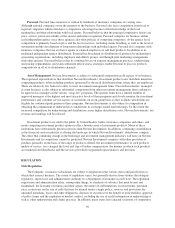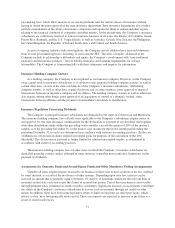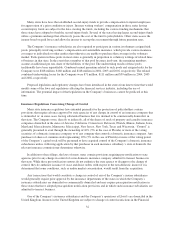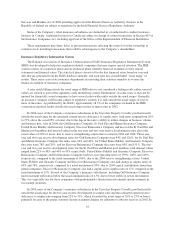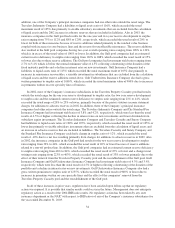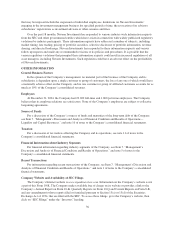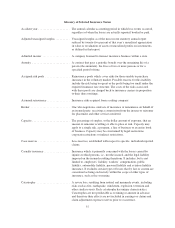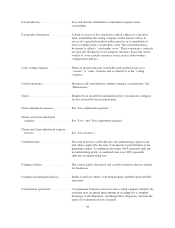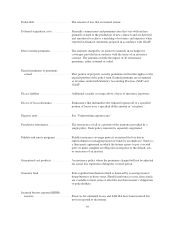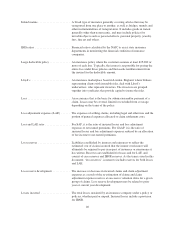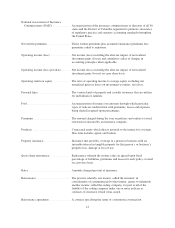Travelers 2004 Annual Report Download - page 44
Download and view the complete annual report
Please find page 44 of the 2004 Travelers annual report below. You can navigate through the pages in the report by either clicking on the pages listed below, or by using the keyword search tool below to find specific information within the annual report.Many states have laws that established second-injury funds to provide compensation to injured employees
for aggravation of a prior condition or injury. Insurers writing workers’ compensation in those states having
second-injury funds are subject to the laws creating the funds, including the various funding mechanisms that
those states have adopted to fund the second-injury funds. Several of the states having larger second-injury funds
utilize a premium surcharge that effectively passes the cost of the fund to policyholders. Other states assess the
insurer based on paid losses and allow the insurer to recoup the assessment through future premium rates.
The Company’s insurance subsidiaries are also required to participate in various involuntary assigned risk
pools, principally involving workers’ compensation and automobile insurance, which provide various insurance
coverages to individuals or other entities that otherwise are unable to purchase that coverage in the voluntary
market. Participation in these pools in most states is generally in proportion to voluntary writings of related lines
of business in that state. In the event that a member of that pool becomes insolvent, the remaining members
assume an additional pro rata share of the liabilities of the pool. The underwriting results of these pools
traditionally have been unprofitable. Combined earned premiums related to such pools and assigned risks for the
Company were $168 million, $160 million and $148 million in 2004, 2003 and 2002, respectively. The related
combined underwriting losses for the Company were $71 million, $111 million and $39 million in 2004, 2003
and 2002, respectively.
Proposed legislation and regulatory changes have been introduced in the states from time to time that would
modify some of the laws and regulations affecting the financial services industry, including the use of
information. The potential impact of that legislation on the Company’s businesses cannot be predicted at this
time.
Insurance Regulations Concerning Change of Control
Many state insurance regulatory laws intended primarily for the protection of policyholders contain
provisions that require advance approval by state agencies of any change in control of an insurance company that
is domiciled, or, in some cases, having substantial business that it is deemed to be commercially domiciled, in
that state. The Company owns, directly or indirectly, all of the shares of stock of property and casualty insurance
companies domiciled in the states of Arizona, California, Connecticut, Delaware, Florida, Illinois, Indiana, Iowa,
Maryland, Massachusetts, Minnesota, Mississippi, New Jersey, New York, Texas and Wisconsin. “Control” is
generally presumed to exist through the ownership of 10% (5% in the case of Florida) or more of the voting
securities of a domestic insurance company or of any company that controls a domestic insurance company. Any
purchaser of shares of common stock representing 10% (5% in the case of Florida) or more of the voting power
of the Company’s capital stock will be presumed to have acquired control of the Company’s domestic insurance
subsidiaries unless, following application by that purchaser in each insurance subsidiary’s state of domicile, the
relevant insurance commissioner determines otherwise.
In addition to these filings, the laws of many states contain provisions requiring pre-notification to state
agencies prior to any change in control of a non-domestic insurance company admitted to transact business in
that state. While these pre-notification statutes do not authorize the state agency to disapprove the change of
control, they do authorize issuance of cease and desist orders with respect to the non-domestic insurer if it is
determined that some conditions, such as undue market concentration, would result from the acquisition.
Any transactions that would constitute a change in control of any of the Company’s insurer subsidiaries
would generally require prior approval by the insurance departments of the states in which the Company’s
insurance subsidiaries are domiciled or commercially domiciled and may require preacquisition notification in
those states that have adopted preacquisition notification provisions and in which such insurance subsidiaries are
admitted to transact business.
One of the Company’s insurance subsidiaries and the Company’s operations at Lloyd’s are domiciled in the
United Kingdom. Insurers in the United Kingdom are subject to change of control restrictions in the Financial
32


